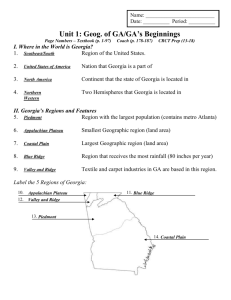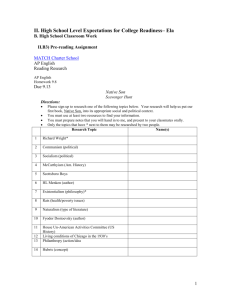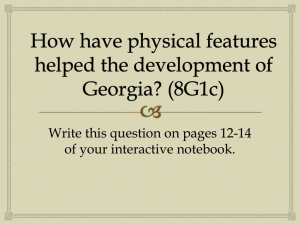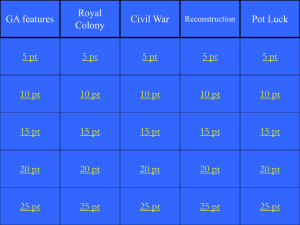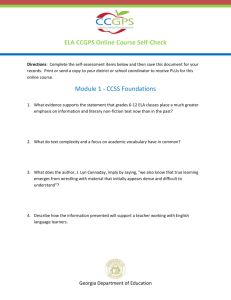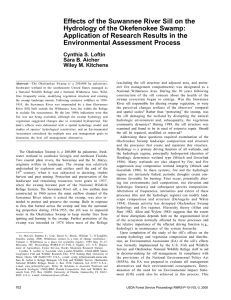Homework!
advertisement
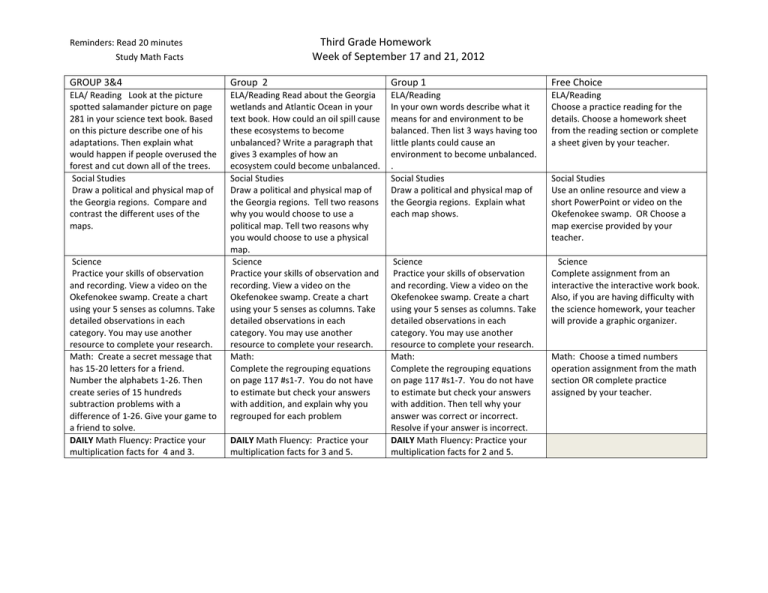
Third Grade Homework Week of September 17 and 21, 2012 Reminders: Read 20 minutes Study Math Facts GROUP 3&4 Group 2 Group 1 Free Choice ELA/ Reading Look at the picture spotted salamander picture on page 281 in your science text book. Based on this picture describe one of his adaptations. Then explain what would happen if people overused the forest and cut down all of the trees. Social Studies Draw a political and physical map of the Georgia regions. Compare and contrast the different uses of the maps. ELA/Reading Read about the Georgia wetlands and Atlantic Ocean in your text book. How could an oil spill cause these ecosystems to become unbalanced? Write a paragraph that gives 3 examples of how an ecosystem could become unbalanced. Social Studies Draw a political and physical map of the Georgia regions. Tell two reasons why you would choose to use a political map. Tell two reasons why you would choose to use a physical map. Science Practice your skills of observation and recording. View a video on the Okefenokee swamp. Create a chart using your 5 senses as columns. Take detailed observations in each category. You may use another resource to complete your research. Math: Complete the regrouping equations on page 117 #s1-7. You do not have to estimate but check your answers with addition, and explain why you regrouped for each problem ELA/Reading In your own words describe what it means for and environment to be balanced. Then list 3 ways having too little plants could cause an environment to become unbalanced. . Social Studies Draw a political and physical map of the Georgia regions. Explain what each map shows. ELA/Reading Choose a practice reading for the details. Choose a homework sheet from the reading section or complete a sheet given by your teacher. Science Practice your skills of observation and recording. View a video on the Okefenokee swamp. Create a chart using your 5 senses as columns. Take detailed observations in each category. You may use another resource to complete your research. Math: Complete the regrouping equations on page 117 #s1-7. You do not have to estimate but check your answers with addition. Then tell why your answer was correct or incorrect. Resolve if your answer is incorrect. DAILY Math Fluency: Practice your multiplication facts for 2 and 5. Science Complete assignment from an interactive the interactive work book. Also, if you are having difficulty with the science homework, your teacher will provide a graphic organizer. Science Practice your skills of observation and recording. View a video on the Okefenokee swamp. Create a chart using your 5 senses as columns. Take detailed observations in each category. You may use another resource to complete your research. Math: Create a secret message that has 15-20 letters for a friend. Number the alphabets 1-26. Then create series of 15 hundreds subtraction problems with a difference of 1-26. Give your game to a friend to solve. DAILY Math Fluency: Practice your multiplication facts for 4 and 3. DAILY Math Fluency: Practice your multiplication facts for 3 and 5. Social Studies Use an online resource and view a short PowerPoint or video on the Okefenokee swamp. OR Choose a map exercise provided by your teacher. Math: Choose a timed numbers operation assignment from the math section OR complete practice assigned by your teacher. Reminders: Read 20 minutes Study Math Facts Third Grade Homework Week of September 17 and 21, 2012 How to Use the 3rd Grade Homework Sheet 1. Student will complete assignments from this sheet over a one week period. 2. Students are assigned a group. They will circle their assigned group when they receive the homework sheet. 3. Students must complete all content activities. 4. Students must complete the reading and math task assigned to their group. 5. Students must complete one activity from “Free Choice” category. 6. Students will submit assignments daily. Science-Georgia Habitats and how environments change Social Studies- Geography Skills (directions-cardinal and intermediate, types of maps-political and physical) Reading/ELA-Main Idea and Details; Finding details in a text; Literary skills(finding details in the text about the characters.); Irregular nouns; opinions (supporting answers with reasons) Math- regrouping up to thousands; estimations (to the tens and hundreds) Key vocabulary- ecosystems, environment, habitat, piedmont, coastal plains, mountains, wetlands, conservation, balance, drought, physical map, political map, cardinal directions, and intermediate directions
